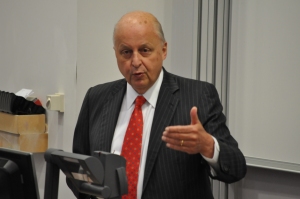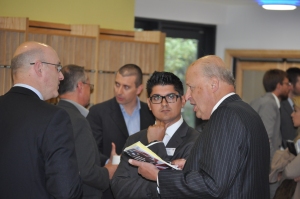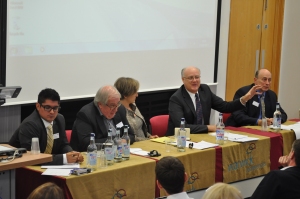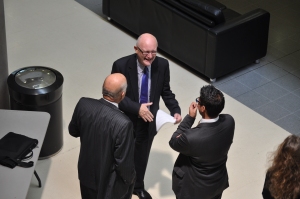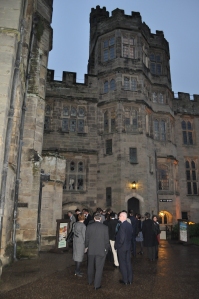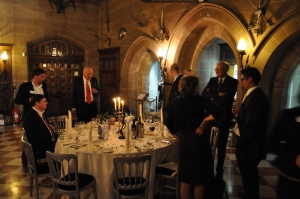- The establishment of a transitional governing body with full executive powers – which includes members of the government and opposition.
- The establishment of a meaningful national dialogue process.
- Review of the constitutional order and legal system.
- Free and fair multiparty elections.
- Full representation of women in all aspects of the transition.
Iranian inconsistency in Geneva? No, just a recalculation.
Todays media question:
Q :How do you view the incosisitant attaitude of Rouhani? Does it mean that Rouhani is actually nothing different with Ahmadinejad?
Egyptian Democracy and US Foreign Policy
Secretary Kerry’s recent trip to the region has refreshed the internal debate in Washington DC — this is a debate which is as confused as it is confusing. It is a rehash of the classic debate between democracy versus stability and security. What’s clear is that, in Washington circles, the operating premise since the Arab Spring has been that — we are not going to return to a period of stability any time soon, and the idea that Egypt will transition to a democracy is problematic. Moreover, the notion that Egypt will move towards a democracy in a linear fashion is, to all effective purposes, dead (it should be said that very few in Washington circles held this belief in the first place; we shouldn’t confuse hopes and beliefs).
The feeling in Washington is that we are going through transitional iterations, from SCAF, to the Muslim Brotherhood and now the Sisi period. In this sense we have been witnessing transition”s” in Egypt that have taken the shape of revolutions, counter-revolutions and Coups. Within such a context, the day to day operations of the US towards Egypt, is to help this current transition move towards a more democratic outcome. That is to say, US policy officially and unofficially is to try and influence Egypt’s transitional move in a more democratic direction as other interests are secured. But the talk is of a period of “transition (to somewhere unknown)”, and not a “democratic transition” overall.
In spite of Obama’s speech to the UN General Assembly at the end of September, which clearly downgraded the importance of democracy promotion to a secondary interest, there is still talk of democracy promotion being one of many interests in the region. Indeed, top US officials still argue that Secretary Kerry and his counter part Secretary Hegel continue to argue for democracy behind the scenes. This is why the US is tying its hopes to the roadmap process, and felt the need to at least censure the Egyptian’s by cutting aid in early October. But ultimately in the short-term, democracy promotion is seen as a means to greater security (a democratic peace), that is to be balanced with counter-terrorism cooperation more broadly, growing threats of terrorism in Sini (which is becoming more professionalised and better resourced as weapons move from Libya), interests in proliferation cooperation, and the maintenance of security cooperation with regards to the security of Israel.
So where are we now? Ultimately, the US is facing an increasingly uphill set of challenges because of the chaining geopolitical and geo-strategic landscape of Egypt.
1) It is clear that issues of sequencing for Democracy have reared their head.
2) How to deal with the Muslim Brotherhood, and Islamist parties more generally has also become an issue complicated by Egyptian definitions of “counter-terrorism”.
3) Interventions from the Gulf states attempting to see the irradiation of the Muslim Brotherhood is also a new complication, along with the manner in which their economic support is delaying Egypt coming to terms with dealing with serious structural economic problems. Indeed, Egypt now lives in a state of “just in time financing” that makes reserve adequacy measures meaningless … the economic crisis is coming, but predicting this is now something for soothsayers. Understanding how Egypt’s “muddle through economics” is going to play out is of immediate interest to all — is this going to be more like a Turkish or Pakistani transition.
4) It is clear that the Egyptian military does not have a holistic blueprint for the country, and the committee of 50 is not acting in the manner first envisaged. The military are seeing themselves as protectors of the Egyptian state, but they lack an overall strategic vision. This in and of itself is an opening for the potential for democracy somewhere long down the road, but right now denies external partners a platform for negotiations. The military is looking inwardly looking for security, stability and control, with a direction in mind.
5) Just as we are having trouble engaging from above, it is clear that we are having trouble engaging from below. The Arab Spring has taught us valuable lessons about the nature of social mobilisation in the modern age, that as yet policy and its surrounding apparatus is having difficulty engaging with. This tells us that we need a “deeper” level of engagement with these societies if we are to truly influence the debate about democracy and understand the hopes and desires of the Egyptian people.
6) There is clearly a need to get to grips with the causes of the 2011 revolution, including Egypt’s demographic troubles. This speaks to a broader human security problem, where food and water security, economic security, political security etc. are dealt with and considered in this debate. The Egyptian military are going to look for “consensual politics” rather than “contesting politics”, which means that establishing these levels of human security is as much of interest to them as they should be to the US. This is a point of cooperation, but the US needs to have its eye on democratic transitions if it is to support this route of action — in particular with regard to NGO laws that help provide a litmus test for the US and Egyptian commitments.
All in, there is no magic bullet to Egyptian Democracy, but what is clear is that the new debate in Washington is stuck around many of the same problems, and more, that it was before the Arab Spring. What’s different is the growing instability in the region and the pace of change. This tells us, that ultimately, maybe the tools and our thinking around this issue need to keep pace and be bolder. We need a paradigm shift in how we engage the region that is fit for the 21st Century and not stuck around the policies of the past.
Media Q&A on US-MENA Relations and Kerry’s Tour
1. How would you define America’s current position in the Middle East?
At the heart of the US – Middle East relations is a security versus democracy problem. This problem is caused by a “conflict of interests”. In the short to medium terms the US requires stability to secure the free flow of oil and gas into the world energy market, the movement and protection of military and commercial traffic through the Suez Canal, commercial business contracts, the security of regional allies such as Israel, and cooperation on military, intelligence, counter-terrorism and counter-proliferation issues. At the same time, the virtues of promoting democracy in the region are at least at the rhetorical level well espoused. Not only is promoting democracy seen as an extension of US values, but also as a contribution to a wider democratic peace that many believe will deliver greater international security, peace and prosperity. Immediate security concerns draw the US towards requiring cooperation and stability, whilst promoting democracy creates direct confrontations, stymies cooperation and can create instability. The conflict of interests problem stood as the fundamental problem faced by policymakers before the Arab Awakening, and this remains the case even as a much more fluid and complex policy-context has emerged. It is little wonder, therefore, that the US have ineffectively ebbed backwards and forwards in their democracy promotion strategies even as wide spread populist movements have generated new levels of instability that stretch from the Atlantic Ocean through the Arabian Sea. Given this context, the current US position is to act as a bystander in events and revert towards favouring its core strategic interests in the region. President Obama made this clear in his speech to the UN General Assembly last month, and this was followed up by Susan Rice arguing that the administration wanted a less involved policy in the Middle East as it “pivots” to Asia. Rice’s policy review, which was conducted almost exclusively by the White House, tells us that the current administration is putting a high value on restoring its relationships with Egypt, Saudi Arabia and Israel as it sees these countries as a fundamental part of its security strategy in the region. The problem is that this may well be because the current administration is struggling to come to terms with the changing Middle East and the manner in which the geo-political and geo-strategic landscape is changing. The current administration is trying to be pragmatic, but failing to really grasp how the region is changing.
2.And how effective do you think Kerry’s mideast trip will be?
THIS WEEK
This is a busy week for the Middle East, with some important milestones. We have already seen that Secretary Kerry is attempting to close the rift between Washington and Cairo, on the eve of the Morsi trial. But hopefully there will be some movement on Syria on Tuesday, followed by movement on Iran on Wednesday. Geneva is becoming a very busy place since the onset of the Arab Spring. Thursday sees a continuation of Kerry’s tour, which by now it is clear should be called “the security and stability” tour.
Monday
Morsi faces judiciary
Islamists were planning huge protests at the scheduled start in Cairo of the trial of Egypt’s ousted president, Mohammed Morsi, on charges of inciting the murder of protesters. About 20,000 police officers and soldiers will stand guard. — The trail has now been adjourned until January 2014.
Tuesday
Meeting on Syria
US and Russian officials are to meet international special representative for Syria Lakhdar Brahimi in Geneva, as part of efforts to prepare the way for a full Syria peace conference later in November.
Wednesday
Iran nuclear talks
Tehran and the six major powers return to Geneva for detailed negotiations on Iran’s nuclear programme following last month’s discussions, which both sides called “positive”.
Thursday
Kerry visits Maghreb
The US secretary of state, John Kerry, is to visit Algeria and Morocco as part of a tour of the region, continuing a strategic dialogue with a focus on security and counterterrorism, economics and civil society.
RT Crossfire Advanced Questions and Talking Points
We filmed an episode of Crosstalk today, so I thought I would share my talking points in advance of the show being aired on Monday. Not everything here was said, but the questions they sent in advance will give you a broad sense of what was said on the show.
need to invent a new and different term to describe what is happening
in the Arab Middle East today?
common today (if any thing beyond being Arab Muslim countries)?
in the Arab Middle East) talked of democracy and western values in a
region in the hands of dictators for decades. Where does democracy
stand today in the region?
the region over the past two years?
The show airs on Monday, so any feed back is welcome on here or twitter @ozhassan.
Postscript: Link to Youtube show
Terrorism in North Africa
A: It would be wrong to suggest that the US is shifting its counterterrorism policy from the Middle East to North Africa, as the US has always regarded the two areas as interlinked through its Near East Department and associated policies. Indeed, lets not forget that some of the 9/11 attackers were from Egypt – in North Africa. What is interesting about the two operations the US undertook was that it returned to a rendition policy that was highly unpopular under President George W. Bush. At one level it sends a strong message that the US is willing to “hunt down” these terrorists no matter what time frame has passed, but it also signals a move away from using “Drones” to carryout extrajudicial killings. This extrajudicial killing policy has been the most controversial dimension of the Obama foreign policy, as it goes against current human rights conventions and demonstrates a duplicity on the part of the US.
Q. As far as you’re concerned, in recent years, has terrorism in North Africa gotten so much rampant that it disattracts US’ attention from other issues?
A. The US is capable of pursuing more than one issue at a time, so I don’t think its counter-terrorism policy in North Africa is a distraction. However, the way the policy is framed does distract the US from paying attention to the domestic nature of the problems. Terrorism in North Africa should be seen like a business as much as a political phenomenon. For example, terrorist organisations like Al Qaeda in the Maghreb (AQIM) make millions of dollars through drug trafficking and kidnaps. Dealing with these local and regional problems requires a local and regional strategy. However, with the Arab Spring and the removal of Gaddafi, the West has lost an ally, albeit brutally authoritarian, that was willing to take more regional responsibility for countering terrorism. That is to say that fighting organisations like Al Qaeda in the Maghreb was in Gaddafi’s interest, which is why in 2009 Libyan security leaders met with their counter-parts from Algeria, Mali, Nigeria and Mauritania in the Algerian city Tamanrasset to formulate a regional terrorism strategy. When Gaddafi was removed, the Tamanrasset agreement fell apart, removing the regional ability to deal with a growing counter-terrorism threat. This however, is more of an issue for Europe than for the US.
For my other thoughts on Extremism in North Africa see mine and Elizabeth Iskander’s submission to the UK House of Lord Select Committee looking into the issue (here).
Transatlantic Interests sponsored Conference
On September 16-18 2013, The University of Warwick hosted the Globalisation and American Grand Strategy in a Time of Austerity Conference organized by Oz Hassan, who runs this blogs Transatlantic Interests Project. Over the three days the conference had 120 delegates from around the world, making it the largest US foreign policy focused conference in Europe. The conference was funded by the University of Warwick’s Institute for Advanced Studies, Warwick’s Politics and International Studies department, the US Embassy London, the ESRC, the Institute for the Study of the Americas, and BISA.
It began with an exclusive early career day where a number of high profile international guests exchanged feedback with MA, PhD and Post-Doctoral members about their work. This was followed by a master-class on US policymaking and the creation of the national economic council, delivered by Robert F. Wescott. Dr Wescott is the founder and President of Keybridge Research LLC in Washington D.C. From 1993-94 he was Chief Economist at the President’s Council of Economic Advisors, and from 1999-2001 he served as Special Assistant to the U.S. President for Economic Policy at the White House. As senior economic advisor to President Clinton, he helped to develop the Administration’s policies towards the G-7, other key emerging markets, and the international financial system.
The following day began with discussions about American Leadership, dealing with nuclear proliferation, the European relationship, issues of American exceptionalism, and the looming crisis in Syria. This was followed by discussions over whether America was in decline, and how this related to China’s rise. Evident from the panel was a sense that America should not be written off yet, and China is a potential super power, but isn’t there yet. The following roundtable picked up on these issues discussing the nature of globalization and American power. What became clear is that, unlike over the last five years, the prospects of America’s decline on the international stage are fading. It was agreed that America is less likely to want to act in the future, because of a wide range of issues, but America’s economic and military power is far from fading.
Ambassador John D. Negroponte then picked up these factors in his keynote speech, introduced by the Vice Chancellor Nigel Thrift. Ambassador Negroponte has been US ambassador to Honduras, Mexico, the Philippines, the United Nations and Iraq. He has served twice on the National Security Council staff, first as director for Vietnam in the Nixon Administration and then as deputy national security advisor under President Reagan. He has also held a cabinet level position as the first director of national intelligence under President George W. Bush. His most recent position in government was as deputy secretary of state, where he served as the State Department’s chief operating officer. In 2009 he began a part-time position at Yale University, as a distinguished senior research fellow in grand strategy and lecturer in international affairs. The ambassador provided a highly stimulating discussion and an invigorating question and answer session. He talked about how President Bush was miss sold intelligence that led to the Iraq War (which he believe Bush now regrets), and how the Bush administration believed oil was important – much more so than it actually is. If there was a slow intelligence day, then intelligence reports on oil would be given to VP Cheney to keep his office interested. In what was an open and candid talk, there were a lot of reveals about the way the intelligence community now works, and about the last few decades of American Foreign Policy. The evening was topped off by a speech by Liz Dibble the Deputy Chief of Mission at the US Embassy in London. Delivering her speech in the Great Hall at Warwick Castle, she reminded the audience of the special relationship between the US and the UK, and the dangers that remain in the world – what’s more she was kind enough to go beyond the “standardised version” of such a speech and give real detail about the future of US policy.
US Cuts Aid to Egypt – Holding Back the Toys
The reaction to the Obama administration cutting aid to Egypt has been mixed. Israel has talked of its strategic necessity for peace and the Egyptian government has talked of how they regard it as the “wrong decision” and interference in domestic affairs, whilst Tamarod has welcomed the suspension of aid. Reading twitter as the news began to break showed a level of strategic confusion over why the administration had chosen to act now. Indeed, @slaugtherAM commented how odd it was given the current talks between the Israelis and Palestinians.
Nevertheless, the devil here is in the detail. The symbolic and temporary suspension of 12 F16 fighters, Apache Helicopters, 4 tanks, harpoon missiles, a $260 cash transfer and $300 loan guarantee is not a complete and permanent suspension of aid. The US is continuing to fund education health, counter-terror and military training programmes. In that sense the timing reflects what President Obama eluded to in his speech to the UN general assembly, and ideas about how to react to the coup since July (the current Presidential style is contemplative and slow to say the least – as we witnessed over the troop surge decision in Afghanistan). This is in effect a package that is symbolic and will make very little substantive difference to the US-Egyptian relationship. Yes, the Egyptian’s want the technology – they are good “toys” – but this is not a serious attempt to influence the future political path of Egypt and does not cut deep into the heart of the relationship. What is significant however, is that it reflects the first practical experiment of the Obama administration’s report on US-MENA relations issued just before the Arab Spring began that conclued that peace between Egypt and Israel was no longer premised on the 1978 Camp David agreement, but by the fact that war was not in Egypt’s interest (read more in my book). Is this a significant moment in US-Egypt’s relationship? Maybe – it could turn into an interesting episode but ultimately the stability agenda continues; but it could also be the start of the Obama administration starting to slowly enact some of the strategic thinking about how to develop a grand strategy for the MENA region that it developed at the end of 2010 and throughout the Arab revolutions. Yet, given the strategic importance of Egypt, the former is more likely.
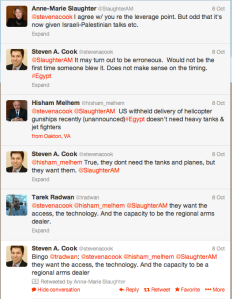
Conversation on Twitter
(For an excellent commentary see @tcwittes here)
Related articles
- US to cut military and economic aid to Egypt (theguardian.com)
- Mixed Messages: The Withholding of Military Aid From Egypt (globalsecurityandinternationalpolicy.wordpress.com)
- White House cuts Egypt aid (politico.com)
- Egypt condemns US aid suspension (bbc.co.uk)
- U.S. Will Cut Aid to Egypt (world.time.com)
- US withholds Egypt military aid (bbc.co.uk)
- State Department: US to suspend hundreds of millions in military and other aid to Egypt – @AP (bigstory.ap.org)
- Kerry: Cut in Egypt Aid Is Not US Withdrawal (abcnews.go.com)
- Israel Expresses Concern Over Significant US Suspension of Military Aid to Egypt (reason.com)
What does the Kidnap and release of Ali Zeidan tells us about Libya?
The kidnap and release of Ali Zeidan tells us what we already knew about the current situation in Libya. The security situation in the country is deeply precarious and “revolutionary” militias are ultimately in power. They out number, by size and firepower, the official police and army, and have a limited and tenuous loyalty to the countries institutions. This is a serious problem, which combined with the presence of terrorist organisations like AQIM in the country, raises serious challenges for North African, European, and the American government.
The revolutionary group that kidnapped Zeidan argued that because the Libyan government agreed to the US violation of sovereignty, when they captured Abu Anas al-Liby on Saturday, they were acting as an “Anti-crime agency” against a PM they regard as violating the law. The fact that they could take him from the Corinthia Hotel, which is supposed to be one of the most secure locations in the country is deeply problematic and tells us who really has power. This is not a government capable of protecting itself, never mind maintaing security and law and order across the country.
I was asked earlier today to comment on Channel NewsAsia, about what this means for foreigners in the country, who Zeidan is now seeking to reassure. This is deeply problematic as it sends a clear signal that the security situation post-Bengazi attacks has not improved. (I’ve been told foreigners can get around the country for the most part, but low profile is the way forward). For details on how to build Libya’s security sector, people should see Frederic Wehrey and Peter Cole’s policy outlook here.
I’ve also been asked by a lot of media outlets about the prospects for democracy in the country. The thing people need to have in mind is that; when a revolution and international intervention remove a government they leave a political and security space open within that country. As a new government fills this space the international community asks them to do two opposing things 1) centralise power to form a new state; 2) move towards democracy. This is asking them to centralise and decentralise power at the same time, and this is all in a scenario where there is no security. Therefore to move to democracy, first steps need to be centralising state power and the maintenance of security across the country. This should be done in conjunction with a truth and reconciliation dialogue initiative. It is only by both securing and reconstructing the state and coming to terms with the past and forming a consensus on the future that progress on deepening democratic institutions can be made.
Related articles
- Libyan Prime Minister kidnapped: negotiations under way for Ali Zeidan’s release (telegraph.co.uk)
- Libya: Prime Minister Ali Zeidan back at work after being freed from kidnappers (euronews.com)
- Libyan PM Ali Zeidan kidnapped by armed men (aljazeera.com)
- Libyan prime minister Ali Zeidan ‘freed following kidnap’ (theguardian.com)
- Libyan PM ‘taken by armed men’ (bbc.co.uk)
- Freed Libyan PM calls for calm (bbc.co.uk)
- Aide: Libyan Prime Minister Ali Zeidan kidnapped (usatoday.com)

